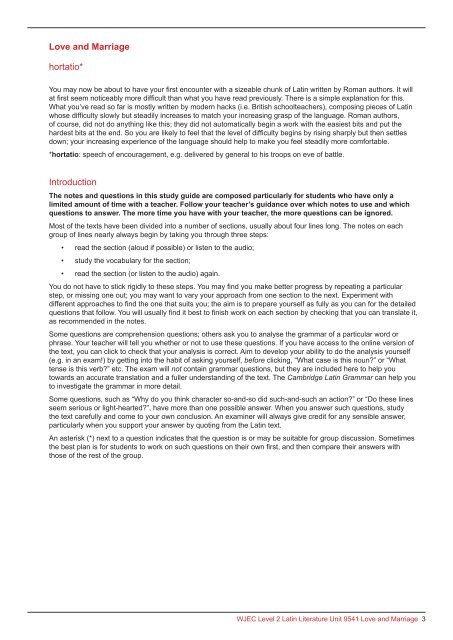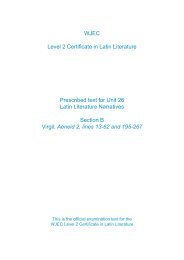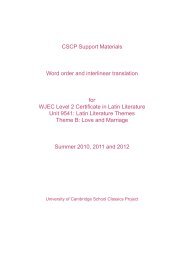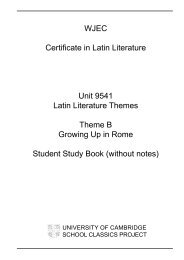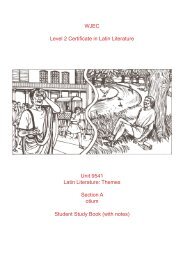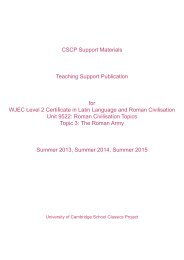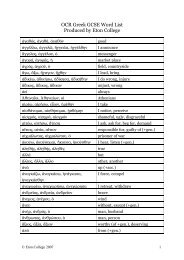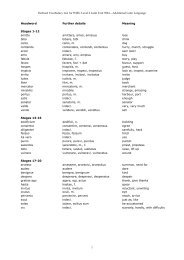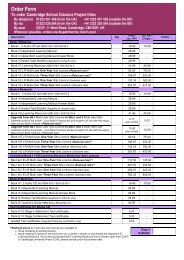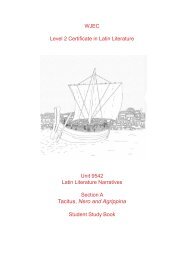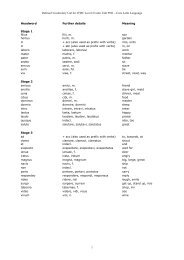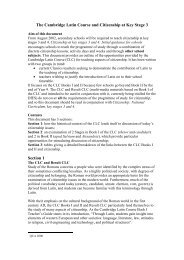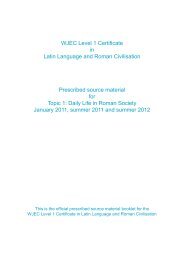2. Student Study Book - Cambridge School Classics Project
2. Student Study Book - Cambridge School Classics Project
2. Student Study Book - Cambridge School Classics Project
You also want an ePaper? Increase the reach of your titles
YUMPU automatically turns print PDFs into web optimized ePapers that Google loves.
Love and Marriagehortatio*You may now be about to have your first encounter with a sizeable chunk of Latin written by Roman authors. It willat first seem noticeably more difficult than what you have read previously. There is a simple explanation for this.What you’ve read so far is mostly written by modern hacks (i.e. British schoolteachers), composing pieces of Latinwhose difficulty slowly but steadily increases to match your increasing grasp of the language. Roman authors,of course, did not do anything like this; they did not automatically begin a work with the easiest bits and put thehardest bits at the end. So you are likely to feel that the level of difficulty begins by rising sharply but then settlesdown; your increasing experience of the language should help to make you feel steadily more comfortable.*hortatio: speech of encouragement, e.g. delivered by general to his troops on eve of battle.IntroductionThe notes and questions in this study guide are composed particularly for students who have only alimited amount of time with a teacher. Follow your teacher’s guidance over which notes to use and whichquestions to answer. The more time you have with your teacher, the more questions can be ignored.Most of the texts have been divided into a number of sections, usually about four lines long. The notes on eachgroup of lines nearly always begin by taking you through three steps:•••read the section (aloud if possible) or listen to the audio;study the vocabulary for the section;read the section (or listen to the audio) again.You do not have to stick rigidly to these steps. You may find you make better progress by repeating a particularstep, or missing one out; you may want to vary your approach from one section to the next. Experiment withdifferent approaches to find the one that suits you; the aim is to prepare yourself as fully as you can for the detailedquestions that follow. You will usually find it best to finish work on each section by checking that you can translate it,as recommended in the notes.Some questions are comprehension questions; others ask you to analyse the grammar of a particular word orphrase. Your teacher will tell you whether or not to use these questions. If you have access to the online version ofthe text, you can click to check that your analysis is correct. Aim to develop your ability to do the analysis yourself(e.g. in an exam!) by getting into the habit of asking yourself, before clicking, “What case is this noun?” or “Whattense is this verb?” etc. The exam will not contain grammar questions, but they are included here to help youtowards an accurate translation and a fuller understanding of the text. The <strong>Cambridge</strong> Latin Grammar can help youto investigate the grammar in more detail.Some questions, such as “Why do you think character so-and-so did such-and-such an action?” or “Do these linesseem serious or light-hearted?”, have more than one possible answer. When you answer such questions, studythe text carefully and come to your own conclusion. An examiner will always give credit for any sensible answer,particularly when you support your answer by quoting from the Latin text.An asterisk (*) next to a question indicates that the question is or may be suitable for group discussion. Sometimesthe best plan is for students to work on such questions on their own first, and then compare their answers withthose of the rest of the group.WJEC Level 2 Latin Literature Unit 9541 Love and Marriage 3


